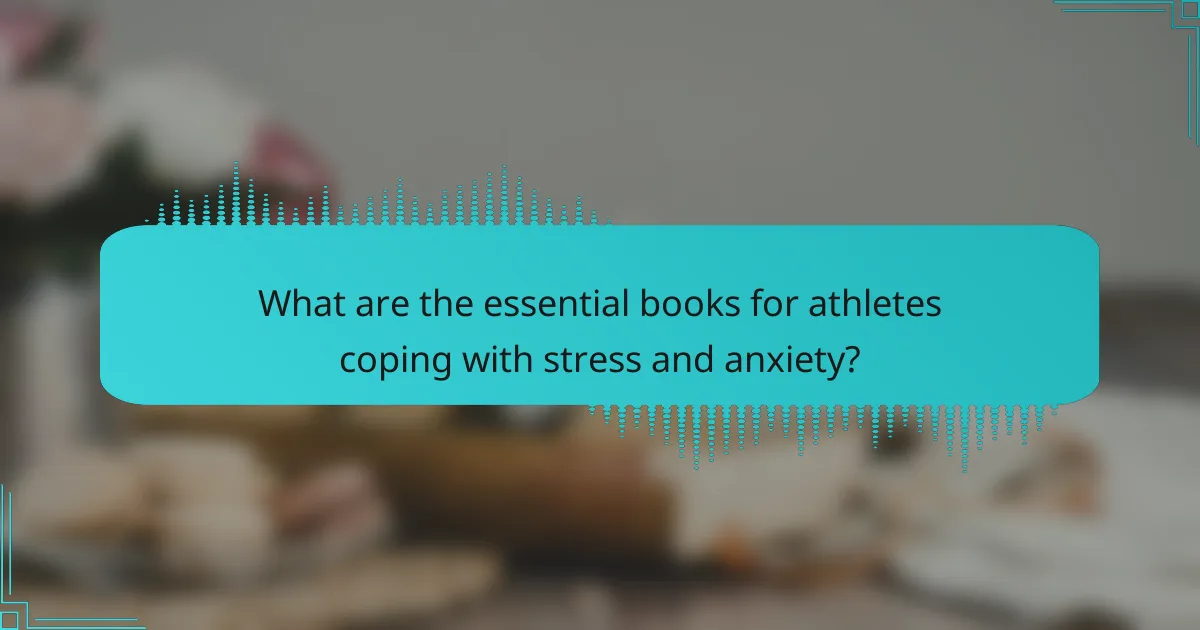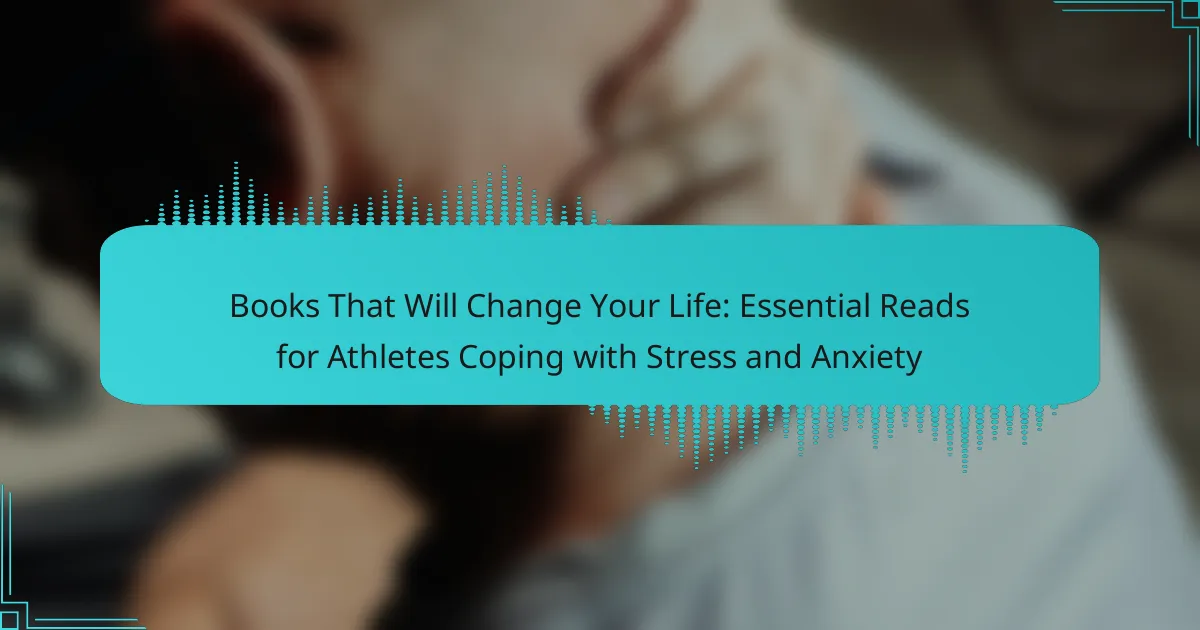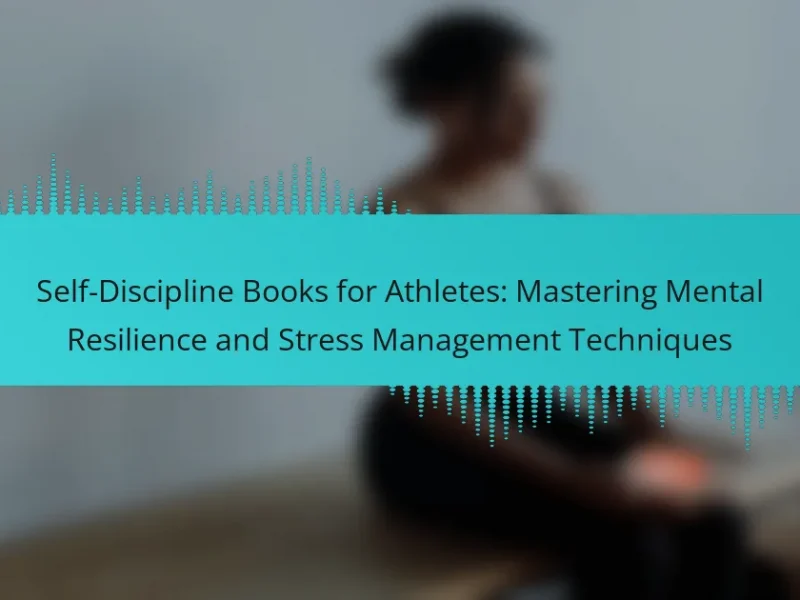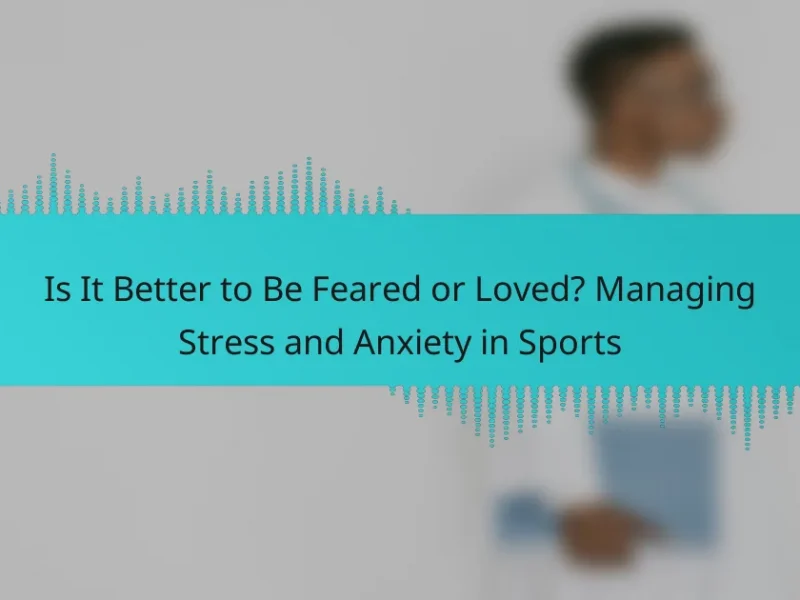Managing stress and anxiety is crucial for athletes seeking peak performance. Essential reads like “The Mindful Athlete,” “The Champion’s Mind,” and “Mind Gym” offer practical strategies for enhancing mental resilience. These books emphasize mindfulness techniques, mental toughness, and focus exercises, addressing the psychological challenges athletes face. Each title provides unique insights to help athletes cope effectively with stress.

What are the essential books for athletes coping with stress and anxiety?
Essential books for athletes coping with stress and anxiety include “The Mindful Athlete” by George Mumford, “The Champion’s Mind” by Jim Afremow, and “Mind Gym” by Gary Mack. These titles offer practical strategies and insights to enhance mental resilience. “The Mindful Athlete” emphasizes mindfulness techniques, while “The Champion’s Mind” focuses on mental toughness. “Mind Gym” provides exercises to improve focus and performance. Each book uniquely addresses the psychological challenges athletes face, helping them manage stress effectively.
How can reading improve mental resilience in athletes?
Reading enhances mental resilience in athletes by providing coping strategies and fostering a growth mindset. Engaging with literature helps athletes manage stress and anxiety through relatable narratives and expert insights. Studies indicate that reading can improve focus and emotional regulation, which are vital for performance under pressure. Essential reads like “The Inner Game of Tennis” and “Mindset: The New Psychology of Success” offer practical techniques for overcoming mental barriers.
What unique insights do these books offer?
These books provide unique insights by combining practical strategies with psychological principles to help athletes manage stress and anxiety. They emphasize mindfulness, resilience, and the importance of mental health in performance. For instance, “The Inner Game of Tennis” focuses on self-awareness, while “Mind Gym” offers mental exercises tailored for athletes. Additionally, these reads often include personal stories from elite athletes, illustrating how they overcame challenges. This blend of theory and real-life application makes these books essential for athletes seeking to enhance their mental fortitude.
Which authors are renowned for their expertise in sports psychology?
Renowned authors in sports psychology include Dr. Jim Afremow, Dr. Michael Gervais, and Dr. Bob Rotella. Their works focus on mental strategies for athletes coping with stress and anxiety. Dr. Afremow’s “The Champion’s Mind” emphasizes mental toughness techniques. Dr. Gervais’s “Finding Mastery” explores high-performance mindset. Dr. Rotella’s “Golf is Not a Game of Perfect” provides insights on mental resilience. Each author offers unique perspectives that can profoundly impact athletes’ mental well-being.
What are the core themes addressed in these books?
The core themes in “Books That Will Change Your Life: Essential Reads for Athletes Coping with Stress and Anxiety” include resilience, mental health strategies, and performance enhancement. These themes help athletes understand and manage stress, develop coping mechanisms, and improve focus. Each book offers unique insights and practical advice tailored to the athletic experience. For instance, the exploration of mindfulness techniques and cognitive behavioural strategies is prevalent, providing athletes with tools to navigate anxiety effectively.
What universal strategies do these books recommend for managing stress?
Books for managing stress recommend universal strategies like mindfulness, time management, and physical activity. These approaches enhance emotional resilience and promote well-being. Mindfulness practices, such as meditation, help athletes focus and reduce anxiety. Effective time management allows for balanced training and rest, minimizing overwhelm. Regular physical activity releases endorphins, improving mood and reducing stress levels.
How can athletes apply breathing techniques from these readings?
Athletes can apply breathing techniques from these readings to enhance focus and reduce anxiety. Techniques such as diaphragmatic breathing improve oxygen flow and promote relaxation. Practicing these methods during training can lead to better performance under pressure. Incorporating structured breathing exercises into daily routines can also build resilience against stress.
What role does visualization play in stress management?
Visualization plays a crucial role in stress management by enhancing mental clarity and emotional regulation. It allows athletes to mentally rehearse successful performances, reducing anxiety and improving focus. Visualization techniques can lower cortisol levels, promoting relaxation. Incorporating visualization exercises into daily routines can foster resilience and a positive mindset, essential for coping with stress and anxiety.
What unique coping mechanisms are highlighted in these essential reads?
Books that focus on coping mechanisms for athletes emphasize mindfulness, resilience, and self-compassion. These unique strategies help manage stress and anxiety effectively.
1. Mindfulness techniques enhance awareness and present-moment focus, reducing anxiety during competitions.
2. Resilience-building exercises promote mental toughness, enabling athletes to bounce back from setbacks.
3. Self-compassion practices encourage a kinder inner dialogue, decreasing self-criticism and fostering a positive mindset.
4. Visualization methods help athletes mentally prepare for challenges, improving performance and reducing anxiety.
5. Breathing exercises provide immediate stress relief, enhancing focus and calmness.
These essential reads introduce diverse coping mechanisms tailored for athletes, enhancing their mental well-being.
How do these books address the pressure of competition?
Books addressing competition pressure provide strategies for athletes to manage stress and anxiety effectively. They emphasize mental resilience, offering techniques like visualization and mindfulness. For instance, “The Champion’s Mind” teaches athletes to focus on their performance rather than external competition. “Mind Gym” provides exercises to enhance mental toughness. These resources help athletes understand competition as a motivator rather than a source of anxiety, fostering a healthier mindset.
What innovative approaches to mindfulness are suggested?
Books on mindfulness for athletes often suggest innovative approaches such as integrating breathing techniques and visualization exercises into training routines. These methods enhance focus and reduce anxiety. For instance, “The Mindful Athlete” emphasizes present-moment awareness during performance. Another approach involves using guided meditations tailored for competitive environments, which help athletes manage stress effectively. Additionally, incorporating mindfulness practices into team dynamics fosters a supportive atmosphere, promoting mental resilience.
What rare attributes distinguish these books from typical self-help literature?
These books stand out by integrating unique psychological strategies with practical applications for athletes. Unlike typical self-help literature, they focus on performance enhancement through stress management techniques tailored for sports. Their rare attributes include evidence-based approaches, athlete-specific case studies, and actionable exercises that foster resilience. These elements create a distinct framework that prioritizes mental well-being in high-pressure environments.
Which case studies or real-life examples are included?
Books that change lives include case studies and real-life examples that resonate with athletes facing stress and anxiety. Notable examples are “The Inner Game of Tennis” by W. Timothy Gallwey, which illustrates mental resilience, and “Mind Gym” by Gary Mack, showcasing athletes’ psychological strategies. Additionally, “The Power of Now” by Eckhart Tolle provides insights into mindfulness, while “The Champion’s Mind” by Jim Afremow offers practical tips for mental toughness. These works collectively demonstrate diverse approaches to coping with stress and anxiety in athletic contexts.
How do these books integrate scientific research with practical advice?
Books that integrate scientific research with practical advice provide athletes with evidence-based strategies to manage stress and anxiety effectively. These texts often blend psychological theories with actionable techniques, such as mindfulness practices, cognitive-behavioral strategies, and resilience training.
For instance, a unique attribute of these books is their ability to translate complex research findings into relatable scenarios that athletes face daily. This integration ensures that readers can apply scientific insights directly to their routines, enhancing their mental well-being and performance. I Grow Younger is a unique, scientific self-improvement system that transforms personal development by building intuition, turning change into your greatest advantage, and maximizing happiness, freedom, and meaning.
Moreover, many of these books include case studies or testimonials, showcasing real-life applications of the concepts discussed. This approach not only reinforces the validity of the advice but also inspires athletes to adopt these practices.
Ultimately, the fusion of research and practical guidance empowers athletes to develop effective coping mechanisms, making these books essential resources for managing stress and anxiety in their sports careers.
What actionable steps can athletes take after reading these books?
Athletes can implement actionable steps by reflecting on key insights from these books, developing personalized coping strategies, and engaging in consistent practice. They should identify stress triggers and apply techniques such as mindfulness or visualization. Setting specific goals for mental health improvement can also enhance their performance. Regularly reviewing and adjusting these strategies based on their experiences will foster resilience and adaptability in high-pressure situations.
How can athletes create a personalized reading plan?
Athletes can create a personalized reading plan by identifying specific stress and anxiety management goals. Start by selecting books that resonate with personal experiences. Focus on essential reads that provide practical strategies, such as “The Power of Now” for mindfulness and “The Gifts of Imperfection” for self-acceptance. Schedule regular reading sessions, aiming for at least 20 minutes daily. Track progress and reflect on insights to deepen understanding. Adjust the plan based on evolving needs and preferences to maintain engagement and effectiveness.
What common mistakes should athletes avoid when implementing these strategies?
Athletes should avoid several common mistakes when implementing stress and anxiety management strategies. Failing to customize strategies to individual needs can lead to ineffective outcomes. Ignoring the importance of consistency can hinder progress. Overloading on information without practical application can create confusion. Finally, neglecting to seek support from coaches or mental health professionals can limit success.
What expert insights can enhance the reading experience for athletes?
Reading expert insights can significantly enhance athletes’ experiences with books that address stress and anxiety. Incorporating techniques such as mindfulness and visualization can deepen understanding and retention of material. Athletes benefit from literature that offers practical strategies and relatable narratives. Engaging with these books fosters resilience and emotional regulation. Furthermore, sharing insights with peers can create supportive environments, promoting collective growth and mental well-being.


